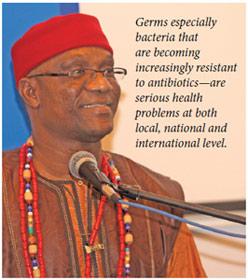|
July 2015

Issue Home >>
|

 Newly-appointed Professors of The UWI are encouraged to give Public Lectures to share their specific areas of research with the wider community. Professor Akpaka’s lecture titled "Microbes without borders, tracking the molecular epidemiology of germs" took place June 18, 2015 at the Amphitheatre A, Faculty of Medical Sciences at the Eric Williams Medical Sciences Complex. Newly-appointed Professors of The UWI are encouraged to give Public Lectures to share their specific areas of research with the wider community. Professor Akpaka’s lecture titled "Microbes without borders, tracking the molecular epidemiology of germs" took place June 18, 2015 at the Amphitheatre A, Faculty of Medical Sciences at the Eric Williams Medical Sciences Complex.
According to Chief Akpaka, “Germs especially bacteria that are becoming increasingly resistant to antibiotics—are serious health problems at both local, national and international level. Drug resistance is definitely a global problem and there are several troubling examples when it comes to global drug resistance to bacteria”.
A native of Nigeria, Chief Akpaka joined The University of the West Indies (UWI) St. Augustine Campus as a Lecturer in 2005 in the Department of Para clinical Sciences. In 2011, he was promoted to the position of Senior Lecturer. His research works have focused on the molecular epidemiology of the germs such as TB, MRSA, multidrug resistant E. coli, Klebsiella and Pseudomonas. His work has aimed at delineating how these germs especially Staphylococcus aureus crosses borders to enter hospitals and even countries. Staphylococcus aureus or “staph" has long been recognized as one of the most important bacteria that cause disease in humans. It is the leading cause of skin and soft tissue infections such as abscesses (boils), furuncles, and cellulitis. Did a special strain of these organisms evolve in hospitals in Trinidad & Tobago? How do we track their activities, movements and infections in Trinidad & Tobago and beyond the region? Are the strains of germs we have here in the country clonally related to those from other countries? Those were some of the questions his lecture attempted to answer.
Professor Akpaka’s chosen area of specialization - Molecular epidemiology in Medical Microbiology, has emerged from the integration of molecular biology into traditional epidemiologic research. “This field improves our understanding of the disease processes by identifying specific organisms, pathways, molecules and genes that influence the risk of developing infectious diseases,” he said. He noted that when molecular techniques are applied to studies of disease, it results in enhanced measurement and increases our ability to more reliably detect associations.

|





